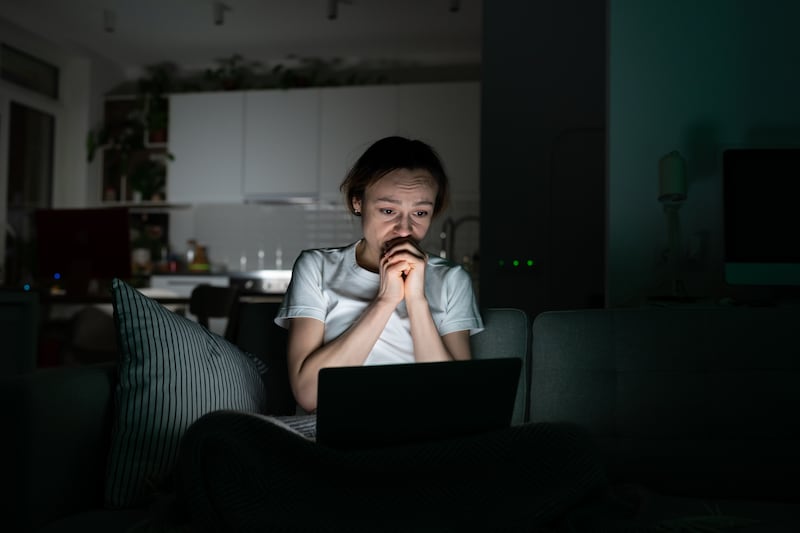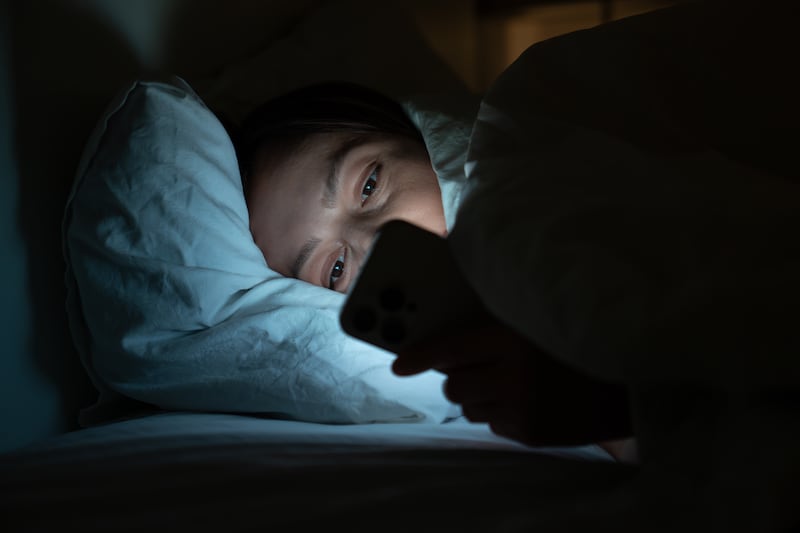We’re living in an age where information from across the world is easily accessible, at our fingertips in a heartbeat—just a tap and swipe away on news apps and social media feeds, all day every day. A recent study by the Pew Research Center found that over 54% of U.S. adults now get their news via social media, a figure that has nearly doubled since 2020.
It’s no surprise that the all-too-addictive behavior known as doomscrolling can impact your mental health, but excessive screen time can also affect your skin. It’s important to stay up-to-date on current events (hey, that’s what we’re here for), but it’s just as important to take care of yourself, both physically and emotionally. Getting nonstop push notifications about the worst of humanity or constantly refreshing your newsfeed, unable to resist clicking on the latest awful thing—well, those habits probably won’t be conducive to the well-being of your mind and body.
Here’s what you need to know about the effects of doomscrolling on your skin and how to fix it—you know, beyond chucking your cellphone out of a window.
What is doomscrolling, and why do we do it?
Doomscrolling happens when an individual struggles to refrain from endlessly engaging with bad news stories or social media content, often leading to feelings of anxiety, stress, depression, or sadness.
“Doomscrolling has a built-in biology to it,” said Gail Saltz, an associate professor of Psychiatry at New York Presbyterian Hospital Weill-Cornell School of Medicine. “You get a hit of your fight-or-flight response where your brain is telling you, ‘you better look, because if you don’t scan for danger, you’re going to be a victim.’”

That wiring is reinforced by dopamine, the feel-good chemical linked to reward. When we feel more informed or prepared, our brains give us a slight boost of satisfaction. But when we consume disturbing content, the stress hormone norepinephrine is released, triggering a jittery, high-alert reaction.
This not only affects individuals’ happiness but also impairs their ability to function and focus on other key routines, such as work, sleep, and self-care.
“Engaging with this material is a constant trigger for stress,” Dr. Saltz told The Daily Beast. “If you’re chronically stressed, then you are chronically producing more circulating cortisol, which has many different effects on physical and mental health.”
How does emotional stress translate to breakouts and inflammation?
The main function of cortisol, also known as the “stress hormone,” is to help regulate blood pressure and glucose levels while also combating inflammation during moments when our bodies enter “fight or flight” mode. But issues arise when cortisol levels become elevated too frequently as a result of stress.
“Engaging with this material is a constant trigger for stress.”
“If [doomscrolling] is something that causes chronic stress in a person, it can have a negative impact on the cosmetic appearance of the skin,” said Jeremy Fenton, a board-certified dermatologist based in New York. “Cortisol in excess can [harm] the skin in the long term, causing it to become thinner or weaker.”
While it may be challenging to look at a person and assume that they spend too much time on social media based on their face, Dr. Fenton said patients can usually recognize the connection themselves. Patients with inflammatory skin conditions like psoriasis, acne, and eczema often realize that their symptoms progressively worsen not only when their stress levels are high but also when they are sleep-deprived.
How does nighttime scrolling hurt your skin?
Like the rest of your body, your skin needs a chance to heal itself. Unfortunately, endlessly thumbing through terrifying news stories can mess with its ability to do that.
“Doomscrolling is a terrible thing to do before going to bed because you’re revving up your system,” Dr. Saltz said. “To sleep, you have to bring on board your parasympathetic nervous system, which is the side that is relaxing.”
Binging the news or your Insta feed before bed not only impacts falling asleep, but the body’s ability to fall back asleep if one were to wake up in the middle of the night due to anxiety. “Your body needs sleep for regeneration, your brain needs sleep, and all of your tissues need sleep in order to trigger the appropriate regeneration and recuperation,” added Dr. Fenton.
“Doomscrolling is a terrible thing to do before going to bed.”
Sleep deprivation can also lead to increased cortisol and other hormone changes, such as a reduction in the production of melatonin, which may impair the skin’s ability to repair itself.
When the body is unable to get the rest it needs to replenish itself, inflammation occurs, which can cause an increase in breakouts, skin sensitivity, redness, irritation, and puffy eyes.
“Sleep is a critical component of your overall health across many different facets,” says Dr. Fenton. “There’s no doubt that sleep deprivation is going to have a negative impact on overall skin health.”
Does blue light really mess with your complexion, or is the issue more complicated than that?
Digital and LED screens emit blue light, a high-energy, short-wavelength visible light. Extended blue light exposure, similar to excessive sun UV rays, can harm the body, causing issues like eye strain and, yes, sleep problems. Some studies suggest blue light may do a number on your skin, but Dr. Fenton noted that these claims remain debated.

“You can find some evidence of the negative effect of blue light on the skin, potentially increasing DNA damage, breakdown of some of the supporting tissue in the skin,” Dr. Fenton says. “But you can also find evidence where blue light is also used therapeutically—it’s used sometimes to help treat, treat acne, and other things.”
Dr. Fenton recommends daily sunscreen and antioxidant serums for anyone who spends a significant amount of time behind a screen and is concerned about the long-term effects it might have on their skin. “If you use sunscreen, a physical sunscreen with a tint is ideal as the iron oxide in tinted sunscreens offers protection against visible light in addition to UV light,” he said.
In other words, next time you notice the moon peeking through your blinds while you’re caught up in a TikTok session, put down your phone and pick up a book instead.
The post Why Doctors Say Doomscrolling Is ‘Terrible’ For Your Skin appeared first on The Daily Beast.




